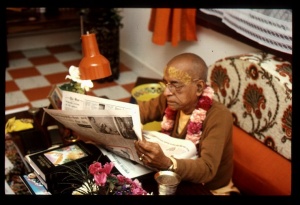SB 4.28.9: Difference between revisions
m (1 revision(s)) |
(Vanibot #0018 edit: make synonym terms in Sanskrit italic in SB - Vanisource) |
||
| Line 1: | Line 1: | ||
{{info | {{info | ||
|speaker= | |speaker=Nārada Muni | ||
|listener=King | |listener=King Prācīnabarhiṣat | ||
}} | }} | ||
[[Category:Srimad-Bhagavatam - Canto 04 Chapter 28|s09 ]] | |||
[[Category:Bhagavatam Verses Spoken by Narada Muni - Vanisource|042809]] | |||
<div style="float:left">'''[[Srimad-Bhagavatam]] - [[SB 4|Fourth Canto]] - [[SB 4.28: Puranjana Becomes a Woman in the Next Life|Chapter 28: Purañjana Becomes a Woman in the Next Life]]'''</div> | |||
<div style="float:right">[[File:Go-previous.png|link=SB 4.28.8]] '''[[SB 4.28.8]] - [[SB 4.28.10]]''' [[File:Go-next.png|link=SB 4.28.10]]</div> | |||
{{RandomImage}} | |||
==== TEXT 9 ==== | ==== TEXT 9 ==== | ||
<div | <div class="verse"> | ||
kāmān abhilaṣan dīno | :kāmān abhilaṣan dīno | ||
yāta-yāmāṁś ca kanyayā | :yāta-yāmāṁś ca kanyayā | ||
vigatātma-gati-snehaḥ | :vigatātma-gati-snehaḥ | ||
putra-dārāṁś ca lālayan | :putra-dārāṁś ca lālayan | ||
</div> | </div> | ||
| Line 16: | Line 22: | ||
==== SYNONYMS ==== | ==== SYNONYMS ==== | ||
<div | <div class="synonyms"> | ||
''kāmān''—objects of enjoyment; ''abhilaṣan''—always lusting after; ''dīnaḥ''—the poor man; ''yāta-yāmān''—stale; ''ca''—also; ''kanyayā''—by the influence of Kālakanyā; ''vigata''—lost; ''ātma-gati''—real purpose of life; ''snehaḥ''—attachment to; ''putra''—sons; ''dārān''—wife; ''ca''—and; ''lālayan''—affectionately maintaining. | |||
</div> | </div> | ||
| Line 23: | Line 29: | ||
==== TRANSLATION ==== | ==== TRANSLATION ==== | ||
<div | <div class="translation"> | ||
The objects of enjoyment became stale by the influence of Kālakanyā. Due to the continuance of his lusty desires, King Purañjana became very poor in everything. Thus he did not understand the aim of life. He was still very affectionate toward his wife and children, and he worried about maintaining them. | The objects of enjoyment became stale by the influence of Kālakanyā. Due to the continuance of his lusty desires, King Purañjana became very poor in everything. Thus he did not understand the aim of life. He was still very affectionate toward his wife and children, and he worried about maintaining them. | ||
</div> | </div> | ||
| Line 30: | Line 36: | ||
==== PURPORT ==== | ==== PURPORT ==== | ||
<div | <div class="purport"> | ||
This is exactly the position of present civilization. Everyone is engaged in maintaining the body, home and family. Consequently everyone becomes confused at the end of life, not knowing what spiritual life and the goal of human life are. In a civilization of sense gratification there cannot be spiritual life, because a person thinks only of this life. Although the next life is a fact, no information is given about it. | This is exactly the position of present civilization. Everyone is engaged in maintaining the body, home and family. Consequently everyone becomes confused at the end of life, not knowing what spiritual life and the goal of human life are. In a civilization of sense gratification there cannot be spiritual life, because a person thinks only of this life. Although the next life is a fact, no information is given about it. | ||
</div> | </div> | ||
__NOTOC__ | |||
<div style="float:right; clear:both;">[[File:Go-previous.png|link=SB 4.28.8]] '''[[SB 4.28.8]] - [[SB 4.28.10]]''' [[File:Go-next.png|link=SB 4.28.10]]</div> | |||
__NOTOC__ | |||
__NOEDITSECTION__ | |||
Revision as of 23:44, 30 November 2017

A.C. Bhaktivedanta Swami Prabhupada
TEXT 9
- kāmān abhilaṣan dīno
- yāta-yāmāṁś ca kanyayā
- vigatātma-gati-snehaḥ
- putra-dārāṁś ca lālayan
SYNONYMS
kāmān—objects of enjoyment; abhilaṣan—always lusting after; dīnaḥ—the poor man; yāta-yāmān—stale; ca—also; kanyayā—by the influence of Kālakanyā; vigata—lost; ātma-gati—real purpose of life; snehaḥ—attachment to; putra—sons; dārān—wife; ca—and; lālayan—affectionately maintaining.
TRANSLATION
The objects of enjoyment became stale by the influence of Kālakanyā. Due to the continuance of his lusty desires, King Purañjana became very poor in everything. Thus he did not understand the aim of life. He was still very affectionate toward his wife and children, and he worried about maintaining them.
PURPORT
This is exactly the position of present civilization. Everyone is engaged in maintaining the body, home and family. Consequently everyone becomes confused at the end of life, not knowing what spiritual life and the goal of human life are. In a civilization of sense gratification there cannot be spiritual life, because a person thinks only of this life. Although the next life is a fact, no information is given about it.